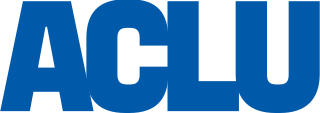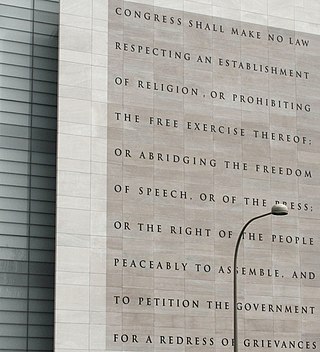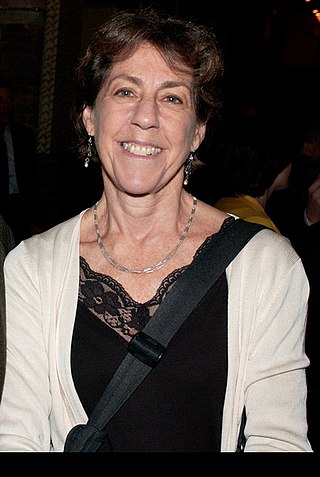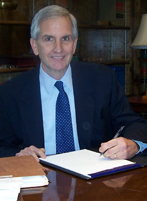
The American Civil Liberties Union (ACLU) is an American nonprofit human rights organization founded in 1920. The organization strives "to defend and preserve the individual rights and liberties guaranteed to every person in this country by the Constitution and laws of the United States". The ACLU works through litigation and lobbying and has over 1,800,000 members as of July 2018, with an annual budget of over $300 million. Affiliates of the ACLU are active in all 50 states, Washington, D.C., and Puerto Rico. The ACLU provides legal assistance in cases where it considers civil liberties at risk. Legal support from the ACLU can take the form of direct legal representation or preparation of amicus curiae briefs expressing legal arguments when another law firm is already providing representation.
Gideon v. Wainwright, 372 U.S. 335 (1963), was a landmark U.S. Supreme Court decision in which the Court ruled that the Sixth Amendment of the U.S. Constitution requires U.S. states to provide attorneys to criminal defendants who are unable to afford their own. The case extended the right to counsel, which had been found under the Fifth and Sixth Amendments to impose requirements on the federal government, by imposing those requirements upon the states as well.
Boy Scouts of America et al. v. Dale, 530 U.S. 640 (2000), was a landmark decision of the US Supreme Court, decided on June 28, 2000, that held that the constitutional right to freedom of association allowed the Boy Scouts of America (BSA) to exclude a homosexual person from membership in spite of a state law requiring equal treatment of homosexuals in public accommodations. More generally, the court ruled that a private organization such as the BSA may exclude a person from membership when "the presence of that person affects in a significant way the group's ability to advocate public or private viewpoints". In a 5-4 decision, the Supreme Court ruled that opposition to homosexuality is part of BSA's "expressive message" and that allowing homosexuals as adult leaders would interfere with that message.

In the United States, freedom of speech and expression is strongly protected from government restrictions by the First Amendment to the U.S. Constitution, many state constitutions, and state and federal laws. Freedom of speech, also called free speech, means the free and public expression of opinions without censorship, interference and restraint by the government. The term "freedom of speech" embedded in the First Amendment encompasses the decision what to say as well as what not to say. The Supreme Court of the United States has recognized several categories of speech that are given lesser or no protection by the First Amendment and has recognized that governments may enact reasonable time, place, or manner restrictions on speech. The First Amendment's constitutional right of free speech, which is applicable to state and local governments under the incorporation doctrine, prevents only government restrictions on speech, not restrictions imposed by private individuals or businesses unless they are acting on behalf of the government. However, It can be restricted by time, place and manner in limited circumstances. Some laws may restrict the ability of private businesses and individuals from restricting the speech of others, such as employment laws that restrict employers' ability to prevent employees from disclosing their salary to coworkers or attempting to organize a labor union.
First National Bank of Boston v. Bellotti, 435 U.S. 765 (1978), is a U.S. constitutional law case which defined the free speech right of corporations for the first time. The United States Supreme Court held that corporations have a First Amendment right to make contributions to ballot initiative campaigns. The ruling came in response to a Massachusetts law that prohibited corporate donations in ballot initiatives unless the corporation's interests were directly involved.
Liberty Counsel is a 501(c)(3) tax-exempt religious liberty organization that engages in litigation related to evangelical Christian values. Liberty Counsel was founded in 1989 by its chairman Mathew Staver and its president Anita L. Staver, who are attorneys and married to each other. The Southern Poverty Law Center has listed Liberty Counsel as an anti-LGBT hate group, a designation the group has disputed. The group is a Christian ministry.

The Enforcement Act of 1871, also known as the Ku Klux Klan Act, Third Enforcement Act, Third Ku Klux Klan Act, Civil Rights Act of 1871, or Force Act of 1871, is an Act of the United States Congress which empowered the President to suspend the writ of habeas corpus to combat the Ku Klux Klan (KKK) and other terrorist organizations who had terrorized and murdered innocent African Americans, public officials, and White sympathizers in the previous Confederate States of America. The act was passed by the 42nd United States Congress and signed into law by United States President Ulysses S. Grant on April 20, 1871. The act was the last of three Enforcement Acts passed by the United States Congress from 1870 to 1871 during the Reconstruction Era to combat attacks upon the suffrage rights of African Americans. The statute has been subject to only minor changes since then, but has been the subject of voluminous interpretation by courts.

Marjorie Heins is a First Amendment lawyer, writer and founder of the Free Expression Policy Project.
National Socialist Party of America v. Village of Skokie, 432 U.S. 43 (1977), arising out of what is sometimes referred to as the Skokie Affair, was a landmark decision of the US Supreme Court dealing with freedom of speech and freedom of assembly. This case is considered a "classic" free speech case in constitutional law classes. Related court decisions are captioned Skokie v. NSPA, Collin v. Smith, and Smith v. Collin. The Supreme Court ruled 5–4, per curiam. The Supreme Court's 1977 ruling granted certiorari and reversed and remanded the Illinois Supreme Court's denial to lift the lower court's injunction on the NSPA's march. In other words: the courts decided a person's assertion that speech is being restrained must be reviewed immediately by the judiciary. By requiring the state court to consider the neo-Nazis' appeal without delay, the U.S. Supreme Court decision opened the door to allowing the National Socialist Party of America to march.
The Florida Justice Institute (FJI) is a nonprofit public interest law firm in Miami, Florida. It was established in 1978 by Randall C. Berg Jr. The institute has been dedicated to improving conditions in Florida's prison system and has initiated numerous class action lawsuits toward this end. Berg is past president of the Florida ACLU. Berg also served on Governor Lawton Chiles' Transition Criminal Justice Task Force and is the past Chairman of the Corrections Committee.
Barnes v. Glen Theatre, Inc., 501 U.S. 560 (1991), was a landmark decision of the U.S. Supreme Court concerning the First Amendment and the ability of the government to outlaw certain forms of expressive conduct. It ruled that the state has the constitutional authority to ban public nudity, even as part of expressive conduct such as dancing, because it furthers a substantial government interest in protecting the morality and order of society. This case is perhaps best summarized by a sentence in Justice Souter's concurring opinion, which is often paraphrased as "Nudity itself is not inherently expressive conduct."

Charles Molony Condon, known as Charlie Condon, is a former Attorney General of the U.S. state of South Carolina. For part of his term, he concurrently served as the first chairman of the Republican Attorneys General Association. Condon is also a former Ninth Circuit solicitor (1980-1991); when he was elected to the position at the age of 27, he became the youngest solicitor in the history of South Carolina. In 2008, he was the chairman of John McCain's presidential campaign in South Carolina. He currently is an attorney in private practice in Mt. Pleasant outside his native Charleston, South Carolina.
Keller v. State Bar of California, 496 U.S. 1 (1990), was a case in which the Supreme Court of the United States held that attorneys who are required to be members of a state bar association have a First Amendment right to refrain from subsidizing the organization’s political or ideological activities.
Pro se legal representation comes from Latin pro se, meaning "for oneself" or "on behalf of themselves" which, in modern law, means to argue on one's own behalf in a legal proceeding, as a defendant or plaintiff in civil cases, or a defendant in criminal cases, rather than have representation from counsel or an attorney.
Jones v. North Carolina Prisoners' Labor Union, 433 U.S. 119 (1977), was a United States Supreme Court case where the court held that prison inmates do not have a right under the First Amendment to join labor unions.
Legal Services Corp. v. Velazquez, 531 U.S. 533 (2001), is a decision of the Supreme Court of the United States concerning the constitutionality of funding restrictions imposed by the United States Congress. At issue were restrictions on the Legal Services Corporation (LSC), a private, nonprofit corporation established by Congress. The restrictions prohibited LSC attorneys from representing clients attempting to amend existing welfare law. The case was brought by Carmen Velazquez, whose LSC-funded attorneys sought to challenge existing welfare provisions since they believed that it was the only way to get Velazquez financial relief.
The passage of the Canadian Charter of Rights and Freedoms in 1982 allowed for the provision of challenging the constitutionality of laws governing prostitution law in Canada in addition to interpretative case law. Other legal proceedings have dealt with ultra vires issues. In 2013, three provisions of the current law were overturned by the Supreme Court of Canada, with a twelve-month stay of effect. In June 2014, the Government introduced amending legislation in response.
NAACP v. Button, 371 U.S. 415 (1963), is a 6-to-3 ruling by the Supreme Court of the United States which held that the reservation of jurisdiction by a federal district court did not bar the U.S. Supreme Court from reviewing a state court's ruling, and also overturned certain laws enacted by the state of Virginia in 1956 as part of the Stanley Plan and massive resistance, as violating the First and Fourteenth Amendments to the United States Constitution. The statutes struck down by the Supreme Court had expanded the definitions of the traditional common law crimes of champerty and maintenance, as well as barratry, and had been targeted at the NAACP and its civil rights litigation.
Americans for Prosperity Foundation v. Bonta, 141 S.Ct. 2373 (2021), is a United States Supreme Court case dealing with the disclosure of donors to non-profit organizations. The case challenged California's requirement that non-profit organizations disclose the identity of their donors to the state's Attorney General as a precondition of soliciting donations in the state. The case was consolidated with Thomas More Law Center v. Bonta. In July 2021, the Supreme Court ruled in a 6–3 decision that California's requirement burdened the donors' First Amendment rights, was not narrowly tailored, and was constitutionally invalid.
Ohralik v. Ohio State Bar Association, 436 US 447 (1978), was a decision by the Supreme Court of the United States that in-person solicitation of clients by lawyers was not protected speech under the First Amendment of the U.S. Constitution.





